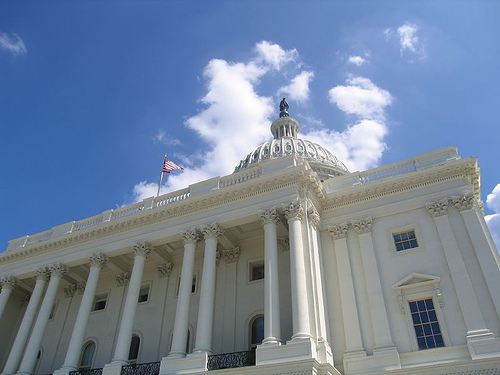Economy Watch: Shutdown, Foreclosure Changes
With the clock still ticking on the end-of-the-week deadline for funding the federal government for a little longer, Congress continued to bicker about a few billion here and a few billion there. House Speaker John Boehner and Senate Majority Leader Harry Reid were reportedly at the White House for late-night talks with President Barack Obama.
April 7, 2011
By Dees Stribling, Contributing Editor
With the clock still ticking on the end-of-the-week deadline for funding the federal government for a little longer, Congress continued to bicker about a few billion here and a few billion there. House Speaker John Boehner and Senate Majority Leader Harry Reid were reportedly at the White House for late-night talks with President Barack Obama.
Meanwhile, government agencies were busy panning for the days (or weeks? or longer?) when they would have to provide government services without any money coming in. One of the immediate effects on a shutdown would be temporary (how temporary?) layoffs of about 800,000 federal workers, which could well adversely affect the economy of places such as Washington, depending on how long the impasse drags on. Also, activities such as the Federal Housing Administration’s loan guarantees for homebuyers would grind to a halt.
The various parties to the shutdown were also gearing up on Wednesday to blame each other for the situation. The last time the government shutdown, in 1995, Congress (and especially Speaker Gingrich) took most of the blame compared with President Clinton, but it isn’t clear that President Obama is going to benefit in that way. According to an NBC News/Wall Street Journal poll on Wednesday, 37 percent of respondents said Congressional Republicans would be to blame; 20 percent said Congressional Democrats; 20 percent said the president; and 17 percent said a pox on all their houses, blaming them all.
Banks Might Agree to Foreclosure Changes
A number of news outlets reported that the top U.S. mortgage services are on the verge of inking an agreement to change some aspects of the foreclosures process, while dodging about $20 billion in penalties for robo-signing and the like, a figure that has been bandied about lately. It’s unclear, however, how any such agreements would affect the probe that all 50 states’ attorneys general have undertaken into slipshod foreclosure practices.
Among other things, the banks–big guns in the mortgage realm such as Bank of America Corp., Citigroup, Wells Fargo & Co. and others–would agree to end foreclosures on homeowners who are still in a loan modification (the “old surprise visit” foreclosure); establish a single point of contact in their organizations for each borrower in foreclosure (presumably to lessen the likelihood of “lost” paperwork); and hire independent parties to review foreclosures (maybe robots can’t apply for those positions).
The state attorneys general would probably be miffed if these agreements precluded some of the remedies they are reportedly pursuing from banks, such as forcing lenders to reduce loan amounts for some borrowers is distress. Naturally, banks are resisting that idea, generally arguing (and without a hint of irony) that the sanctity of contracts is too important allow that to happen.
Appeals Court Confirms Skilling’s Status as Con
In a continuing story that’s also a blast from the past, the U.S. Appeals Court in New Orleans affirmed all of former Enron Corp. CEO Jeffrey Skilling’s convictions on Wednesday. The corporate convict, who’s in the federal big house in Colorado serving a 24-year sentence for hoodwinking Enron investors to the tune of some billions, sought to have the convictions overturned because the U.S. Supreme Court ruled last year that “honest services theft” applies only in cases of bribes or kickbacks, not his particular crimes.
The high court then ordered the lower course to review Skilling’s convictions in light of the new interpretation of the honest services statute. The appeals court determined that the new interpretation didn’t affect Skilling’s essential guilt. “Based on our own thorough examination of the considerable record in this case, we find that the jury was presented with overwhelming evidence that Skilling conspired to commit securities fraud,” the court said in its ruling.
Wall Street had another lackluster day on Wednesday, but at least jitters about the looming federal government shutdown didn’t take the equities markets into negative territory. The Dow Jones Industrial Average was up 32.85 points, or 0.27 percent, while the S&P 500 and the Nasdaq gained 0.22 percent and 0.31 percent, respectively.








You must be logged in to post a comment.